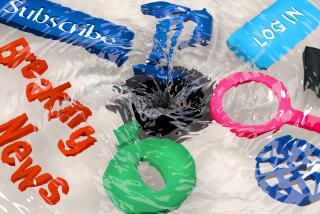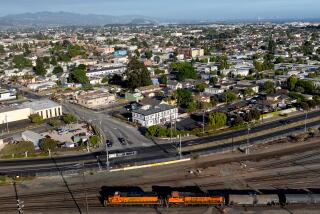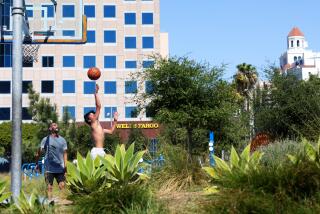Great Read: A newsstand where the world still unfolds as print fades to black
A red truck pulls into an empty parking lot off Fairfax Avenue just before 6 a.m. René Portillo gets out in a rush and heads to a blue shoe box of a building wearing a message in faded paint: “THE NEW YORK TIMES Expect The World.” To the right, a California Lottery banner proclaims: “Millionaire made here.”
Portillo unbolts two padlocks and flicks on the lights. He rips the plastic tether on a stack of newspapers and begins arranging them on a wire rack. Then he hears footsteps.
“Buenos diiiiiiias,” he says, greeting his first customer with the chirpiness of a morning person, even if he might not be one. The men chitchat in Spanish as Portillo rings up the man’s stack: seven copies of the Los Angeles Times, seven more of the New York Times, three USA Todays, two Orange County Registers and one La Opinión.
The man works for CNN and comes in every weekday to buy papers to take to work. After he leaves, Portillo peels his breakfast banana. Then a customer with a tangled, graying beard and dirt caked on his red cheeks shows up, buys a cold Starbucks mocha for $3 and walks around the shop. He pauses in front of a magazine with Kim Kardashian on the cover and asks her a couple of random questions.
“Et tu, Brute?” he says. “Are you ordering a hamburger again?” He puts his ear next to her picture for a second and shrugs. She didn’t answer, he says as he walks out. Portillo laughs and waves goodbye.
It’s just another day at Centerfold International Newsstand.
Sure, Portillo says, the Fairfax neighborhood stand has become a lot less international over the years. When his brother, Manuel, bought the place in 2006, it carried dozens of dailies from overseas: the Times of London, Egypt’s Al Ahram, five newspapers from Italy. Now the brothers make half as much money, and their foreign offerings have dwindled to weekly versions of the Guardian and Le Monde and a Russian-language paper printed in New York.
“People have the Internet for anything,” he says. “Now only old people come in — like me. I don’t like the Internet.”
And yet with several out-of-state newspapers and more than 400 magazines to choose from, including four about wristwatches, Centerfold has managed to survive in a city full of shuttered newsstands. Village Center Newsstand in Westwood closed at the end of last month, and the famously all-night World Book and News in Hollywood shut down a month earlier, although it’s since reopened under new ownership, with a slightly smaller selection.
But if business doesn’t turn around soon, Portillo says, Centerfold will probably go the same way. Calvin Naito, who lives near the newsstand and drops in once a week, doesn’t want to hear that kind of talk.
“If this didn’t exist, I would feel incomplete,” he says. “I really feel like I see the world in 30 minutes.”
::
Before the midmorning lull, a man in an auto mechanic shirt smudged with yesterday’s grease greets Portillo as “jefe” (“boss”) and pays for a lottery ticket in cash. Half an hour later, a blond twentysomething in beige-colored heels and maroon-framed sunglasses comes in and gathers copies of People, Us Weekly and Star under her left arm.
Behind her in line, a woman in a short sundress purses her lips and snaps a cellphone picture of herself as she waits to buy a stack of the same celebrity-gossip magazines. She pulls an American Express corporate card out of her red Prada wallet, hands it to Portillo, thanks him and leaves.
“Otra PR girl,” he says, explaining in Spanglish that like the previous customer, she works for a public relations firm that represents celebrities in those magazines.
Before long, an elderly man in a yarmulke walks in and buys a cup of coffee and a copy of the L.A. Times — with quarters. Then the guy in the mechanic shirt comes in again.
“Another?” Portillo asks.
The man nods and buys a Powerball lottery ticket and a $3 scratcher.
Another customer pulls up a stool next to Portillo, who’s watching the World Cup on a TV in front of the register. Before long one of the Netherlands’ midfielders sneaks a kick past Australia’s goalie, and the voice of the Univision announcer rumbles through the newsstand: “gooooooolaso, gooooooolaso, gooooooolaso.”
In the back of the store, a man walks between the bodybuilding and interior design sections. After 45 minutes of skimming several magazines, he waits for Portillo to get tied up with another customer and slips out. Portillo laughs and shrugs. He’s used to people treating Centerfold like a library.
It gets quiet for a while, and Portillo cleans the counter with Windex and dusts the rack of Cheetos, peanuts and beef jerky. When he looks up, he sees a man with skinny arms and sunken cheeks walking toward him.
“I haven’t seen you in a long time,” Portillo says, smiling. “How are you, man?”
The customer’s shoulders tense up, and he lets out a long sigh as if deciding whether he has the energy to say it again.
“Yeah, man,” he says, pointing to the tufts of peach fuzz on his otherwise bald head. “I got cancer — multiple myeloma.”
Portillo’s eyes widen and he says he is sorry. The man shrugs and points to the lottery tickets.
“So, yeah,” he says. “I need a winner.”
::
By the afternoon, a bit of vice starts creeping into the fluorescent lighted aisles.
There’s the high schooler who buys a lighter and leaves, then returns a few seconds later, clears his throat and asks for a pack of Black & Milds. When asked for an ID, he sticks his right hand into the pocket of his sagging jeans and scoffs, feigning exasperation.
“Weird,” he says, slowly and loudly. “I must’ve left it at home.”
And the middle-aged man with a brown ponytail and white tube socks who grabs a pack of Juicy Fruit gum and a cooking magazine before walking quickly into the corner section labeled “No one under 18 YRS OLD ALLOWED.” He runs his left hand over the cover of a magazine called Naughty Neighbors before settling on a DVD with a woman in lingerie on the cover.
Half an hour later, just as Manuel arrives for his shift and relieves René, the man in the mechanic shirt shows up a third time. He buys two more scratchers, pulls a penny from his pocket and scrapes them. They’re both losers. He flips the coin and it lands heads up in his palm. That’s good luck, he says, so he buys one more. He says he’ll scratch it later.
Manuel feels a bit weird when he thinks about how much money people spend on lottery tickets — but they help bring in customers now that newspapers aren’t selling as they used to. In the late 1980s, he worked at a stand on Robertson Boulevard that sold out of all 800 copies of the L.A. Times every Sunday. Now Centerfold gets 30 copies and usually returns 10 of them.
He remembers when he could pick up a copy of El Salvador’s La Prensa Gráfica and see pictures of the country he left behind, when young people chasing wanderlust pulled the classified section from French newspapers and looked for jobs.
“It was the Internet before the Internet,” he says, smiling sadly. “Probably very soon we won’t have any newsstands at all.”
For now, Manuel says his customers make it worth it. The ones who know him by name and give him $50 for the holidays — his tip for the rest of the year, they say. Customers such as Zarko Milojevic, a Yugoslav émigré who has walked to Centerfold from his home almost every day since he moved into the neighborhood 36 years ago.
“It’s No. 1 in good service,” he says. “And they try to pronounce my name.”
Manuel laughs and explains that he realized a while ago that if he says “charco” — the Spanish word for “puddle” — fast enough, it sounds almost perfect. After buying a copy of the L.A. Times, Milojevic brokers a deal: If Manuel brings his newest granddaughter into work, he’ll bring the congratulatory tequila.
::
Manuel yawns every five minutes or so after sunset, and before long his 20-year-old daughter, Kathy, shows up.
She walks through the shop, deciding which magazines she’ll read during her shift. Of the three employees, she loves the printed word the most — it goes back to the times she’d sneak into a corner of the Encino newsstand where her dad worked and read comic books.
Swiping or clicking through a story will never feel the way that flipping through pages does, she says.
“Kids now are like, ‘Magazines? Eww,’” she says, rolling her eyes. “Internet. Facebook. Blah.”
At 10:55 p.m., just as she starts to close up for the night, a woman walks in. Kathy decides to stay open late so the woman can browse the art section. Fifteen minutes later, as the woman walks out, she lifts to her nose the thick architecture magazine she just bought and inhales.
Twitter: @marisagerber
More to Read
Sign up for Essential California
The most important California stories and recommendations in your inbox every morning.
You may occasionally receive promotional content from the Los Angeles Times.











